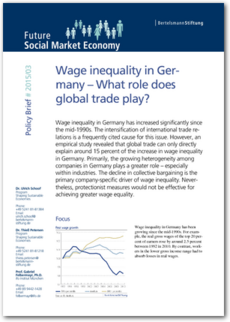Future Social Market Economy Policy Brief #2015/03
Bertelsmann Stiftung (ed.)
Dr. Ulrich Schoof, Dr. Thieß Petersen, Prof. Dr. Gabriel Felbermayr
Policy Brief #2015/03: Wage inequality in Germany – What role does global trade play?
- Format Type
- Date of publication
- 18/03/2015
- Edition
- 1. edition
Format
-
PDF
Price
Free of charge
Description
Wage inequality in Germany has increased significantly since the mid-1990s. The intensification of international trade relations is a frequently cited cause for this issue. However, an empirical study revealed that global trade can only directly explain around 15 percent of the increase in wage inequality in Germany. Primarily, the growing heterogeneity among companies in Germany plays a greater role – especially within industries. The decline in collective bargaining is the primary company-specific driver of wage inequality. Nevertheless, protectionist measures would not be effective for achieving greater wage equality.





